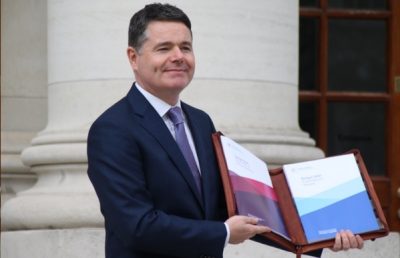
By Cian Molloy - 13 October, 2019
Improvements in targeted supports for vulnerable groups in Budget 2020 are a positive development, says the Society of St Vincent de Paul (SVP), but the measures don’t go far enough to protect those at greatest risk of hardship in the event of a no-deal Brexit.

Minister for Finance and Public Expenditure and Reform Paschal Donohoe who delivered his Budget 2020 speech in the Dáil on Thursday (Pic Dept of Finance).
Overall the social welfare measures in Budget 2020 are insufficient, says the SVP’s head of social justice and policy, Dr Tricia Keilthy.
‘To mitigate the potential impact of Brexit on the poorest households, the Government needed to be proactive and increase social welfare rates for those most at risk of income inadequacy,’ she commented.
‘The failure to do so means hundreds and thousands of households, who are already struggling, will fall even further behind.
‘For the same reasons, we are concerned and disappointed we did not hear any announcement in relation to the proposed increase to the National Minimum Wage.’
SVP national president Kieran Stafford added: ‘The danger of inadequate social welfare is that it can trap people in poverty, leading to greater social, health and economic costs in the future. That’s why Budget 2020 should have sought to reduce the gap between the lowest social welfare rates and the cost of everyday essentials for people.’
Some measures in Thursday’s budget were welcomed by Ireland’s biggest charity. In particular, plans to improve supports provided to one-parent families, where the parent is working, were well received. ‘Earlier this year, we reported that in-work poverty among one parents more than doubled between 2012 and 2017,’ said Dr Keilthy. ‘The measures announced today, including the improvements in the income supports and the Working Family Payment are very positive and will help reverse this upward trend in poverty among working lone parents.’
The charity pointed out that the impact of increases in carbon tax on the poor may increase hardship. Kieran Stafford said: ‘It is really important that the Fuel Allowance is increased in 2020 because its value has diminished in recent years due to energy price hikes. However, offsetting carbon tax increases through the Fuel Allowance is insufficient because the payment is highly means tested. Low income households in rural areas, working poor households and those living in poorly insulated homes in the private rented sector will be particularly impacted by this decision.’
The SVP also expressed disappointment and concern that capitation grants for primary and secondary schools have not been restored to their 2010 levels. This means that the cost of ensuring that children remain at school is a heavy one for parents on low access to education and is ‘the key to breaking the cycle of poverty but costs are a barrier for far too many children and young people’, said Mr Stafford. He argued that the education measures contained in the budget ‘lack ambition’. Stafford also criticised the government’s failure to increase the limit for Rent Supplement payments and Housing Assistance Payments. ‘The gap between the limits and market rents has increased significantly in recent years making it very difficult for low income households to find accommodation,’ he said. ‘The lack of investment in the National Affordable Rental Scheme is a missed opportunity for low-income households needing to access affordable accommodation.’
In summary, Mr Stafford said: ‘On the whole, we don’t believe that this budget protects those most vulnerable in the event of a no-deal Brexit.’